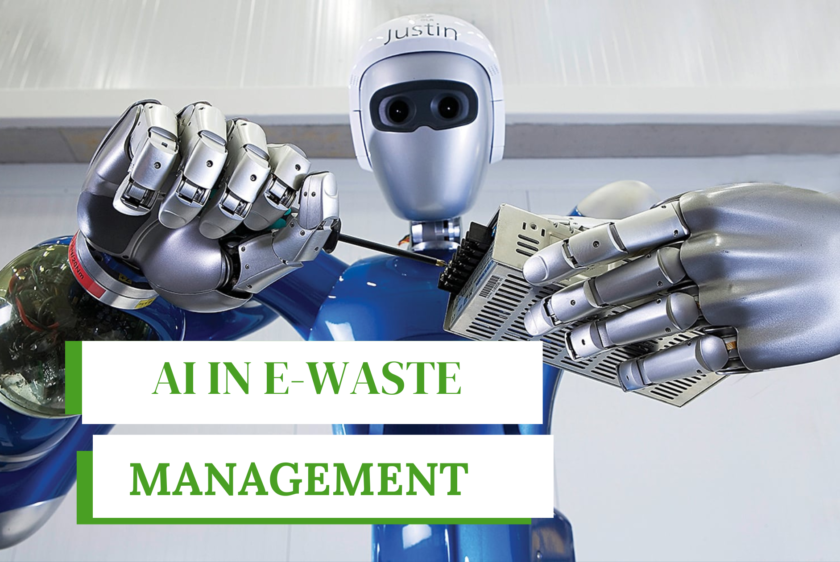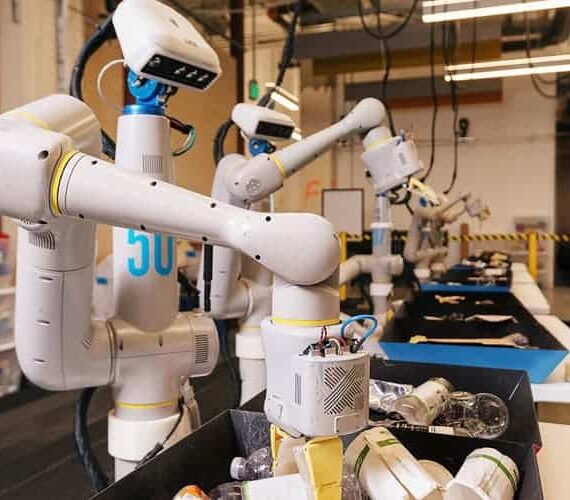
AI in E-Waste Management: How Machines Are Helping Us Recycle More Efficiently
In the digital era, electronic waste (e-waste) has become a significant environmental issue. The fast pace of technological advancement has resulted in a higher production of outdated electronic devices, emphasizing the need for effective e-waste management for a sustainable future. Artificial Intelligence (AI) is one of the remarkable innovations in this field, revolutionizing traditional recycling methods and improving efficiency. This blog will highlight the profound impact of AI on e-waste management, exploring key applications, technological advancements, and the positive strides made in recycling practices.
Artificial Intelligence Impact On E-waste Management
It’s crucial to understand the problem’s scale to comprehend the significance of AI in e-waste management. The constant influx of discarded electronic devices contributes to environmental degradation, health hazards, and resource depletion. Traditional recycling methods often fall short of efficiently handling the large volume and complexity of e-waste.
AI-Powered Applications in E-Waste Management:

Automated Sorting and Segregation:
One of the key applications of AI in e-waste management is sorting and segregating electronic components. Traditional methods are often labor-intensive and prone to errors, but AI-powered machines can quickly and accurately identify and separate different materials. Advanced image recognition and machine learning algorithms enable these systems to distinguish between various types of electronic components, streamlining the recycling process.
Predictive Maintenance:
AI plays a significant role in ensuring the optimal functioning of recycling machinery. Predictive maintenance algorithms analyze real-time data from sensors to predict when equipment is likely to fail. This proactive approach minimizes downtime, reduces maintenance costs, and enhances the overall efficiency of e-waste recycling plants.
Smart Disassembly System:
The disassembly of electronic devices is a crucial step in e-waste recycling, but it can be a complex and time-consuming process. AI-driven robotic systems can now automatically disassemble electronic devices, separating valuable components for recycling. It speeds up the recycling process and ensures that valuable materials are recovered efficiently.
Material Recovery and Reuse:
AI is instrumental in improving the recovery and reuse of materials from e-waste. Machine learning algorithms can identify and extract valuable metals and other materials from electronic devices with high precision. It reduces the environmental impact of mining for raw materials and contributes to a more circular economy by encouraging the reuse of recovered materials in new electronic products.
Technological Advancements in AI for E-Waste Management:
Machine Learning Algorithms:
Machine learning algorithms are at the forefront of AI’s impact on e-waste management. These algorithms continually improve their accuracy and efficiency by learning from data patterns. This adaptability is crucial for handling electronic waste’s diverse and evolving nature.
Robotics and Automation:
AI-powered robotic systems are increasingly being employed for tasks that are dangerous or tedious for human workers. These robots can disassemble electronic devices precisely, facilitating the extraction of valuable components while ensuring worker safety.
Positive Impact on Addressing E-Waste Challenges
Increased Recycling Speed Rates:
AI-driven automation has significantly increased the speed and accuracy of e-waste processing, leading to higher recycling rates. As a result, a larger percentage of electronic devices can be recycled, reducing the environmental impact of improper disposal.
Resource Conservation:
The precise sorting and material recovery enabled by AI contributes to resource conservation. Valuable materials like gold, silver, and copper can be efficiently reclaimed, reducing the need for environmentally damaging mining operations.
Environmental Conservation:
AI in e-waste management plays a crucial role in environmental conservation by minimizing the environmental footprint of e-waste disposal. Proper recycling practices contribute to the reduction of harmful chemicals and pollutants associated with electronic waste.
Economic Opportunities:
AI-driven e-waste management systems create new economic opportunities by fostering the growth of a circular economy. Recovered materials can be reintegrated into the manufacturing process, reducing dependence on finite resources and stimulating economic sustainability.
Conclusion:
The transformative role of Artificial Intelligence in e-waste management is undeniable. It is driving significant advancements in recycling processes. As we continue to harness the power of AI in addressing the challenges of electronic waste, we move closer to a more sustainable and circular approach to technology consumption and disposal. AI technology integration in e-waste management is not just a technological evolution; it’s a critical step toward building a greener and more responsible future.
Follow us:







